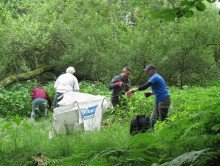Volunteers from Richmond Fellowship mental health charity in Dorset have been taking part in conservation tasks with Dorset Wildlife Trust (DWT), to help aid recovery from mental health problems.
Last Friday, a group worked on an area of land recently acquired by The Erica Trust, close to ‘Happy Bottom’ in Corfe Mullen, part of the new nature reserves in The Great Heath Living Landscape. The volunteers, helped to clear Himalayan Balsam – an invasive species which smothers native plants.
Some of the volunteers are recovering from complex mental health illnesses as a result of substance misuse, social isolation, and homelessness. They use their time outside with nature to socialise, learn new skills and enjoy the wildlife around them.
Eric Longworth suffers from anxiety and depression, and has been volunteering with DWT through Richmond Fellowship for six months. He said: “Doing this work outside gives me peace of mind and clarity. It helps lift my worries. I would recommend it to anyone trying to overcome anxiety – it is hard to make the first jump, but works well alongside my medication and it’s a distraction from the things that worry me. Every time I come out, I learn something different – I saw a bee orchid the other day, which I had never seen before.”
DWT awarded Richmond Fellowship volunteers in 2011 with the ‘Helen Brotherton’ group volunteering award, in recognition of their commitment and enthusiasm towards wildlife.
Sally Wright, Community Conservation Officer for The Great Heath Living Landscape Project said: “It’s a real pleasure working with the volunteers from Richmond Fellowship – they turn up in great spirits and get stuck in, come rain or shine! They do a fantastic job, and some of them are starting the DWT ‘Wildlife Champions’ award scheme*, to recognise their hard work and give them confidence to share their new skills with others in the community.”
Neil Gibson, a Community Link Worker for Richmond Fellowship said: “Volunteering outside is a way to make new friends, socialise and develop an interest in wildlife. We don’t talk about mental health whilst on volunteering tasks, as spending time outdoors is a good distraction, which can help with recovery. We like working as a team to help each other out, and are very grateful to the DWT wardens, who are always very accommodating.”
Volunteering opportunities are available to anyone with an interest in wildlife. The ‘Urban Weekenders’ volunteering activities are on the last Sunday of every month, where volunteers can open a moth trap, and carry out wildlife surveys on Upton Heath. Meet at the Urban Wildlife Centre, Corfe Mullen (BH21 3RX) at 9am.
We are also looking for volunteers to be a part of the new ‘Great Heathwatch group’ – where local people who use the heath regularly can be the ‘eyes and ears’ of Upton Heath, Parley Common, Ferndown Common, Dunyeats, and Lychett Bay, to help DWT manage the land for the benefit of wildlife. For more information about all the Great Heath project volunteering activities, please call Sally Wright on 01202 692033.
For more information about volunteering with DWT and sign-up to our volunteering enewsletter, visit www.dorsetwildlifetrust.org.uk/volunteering












